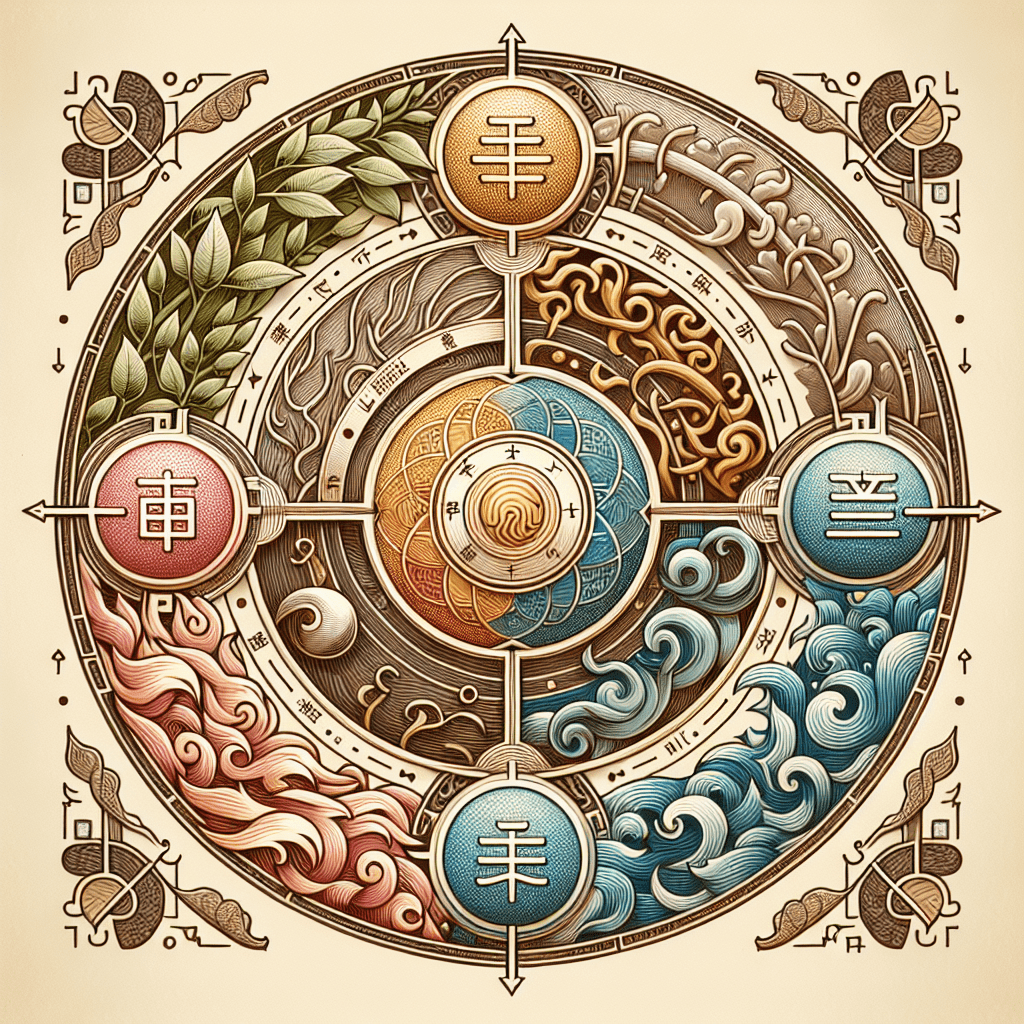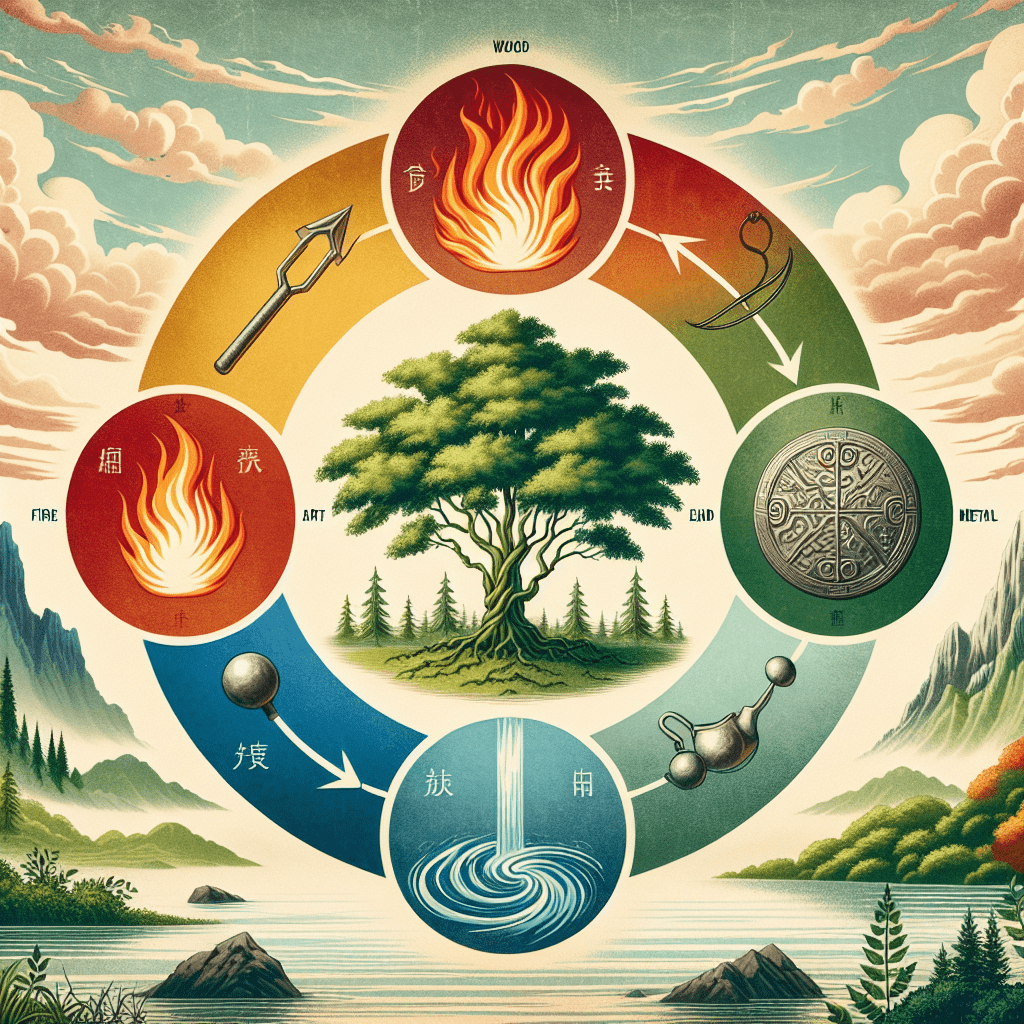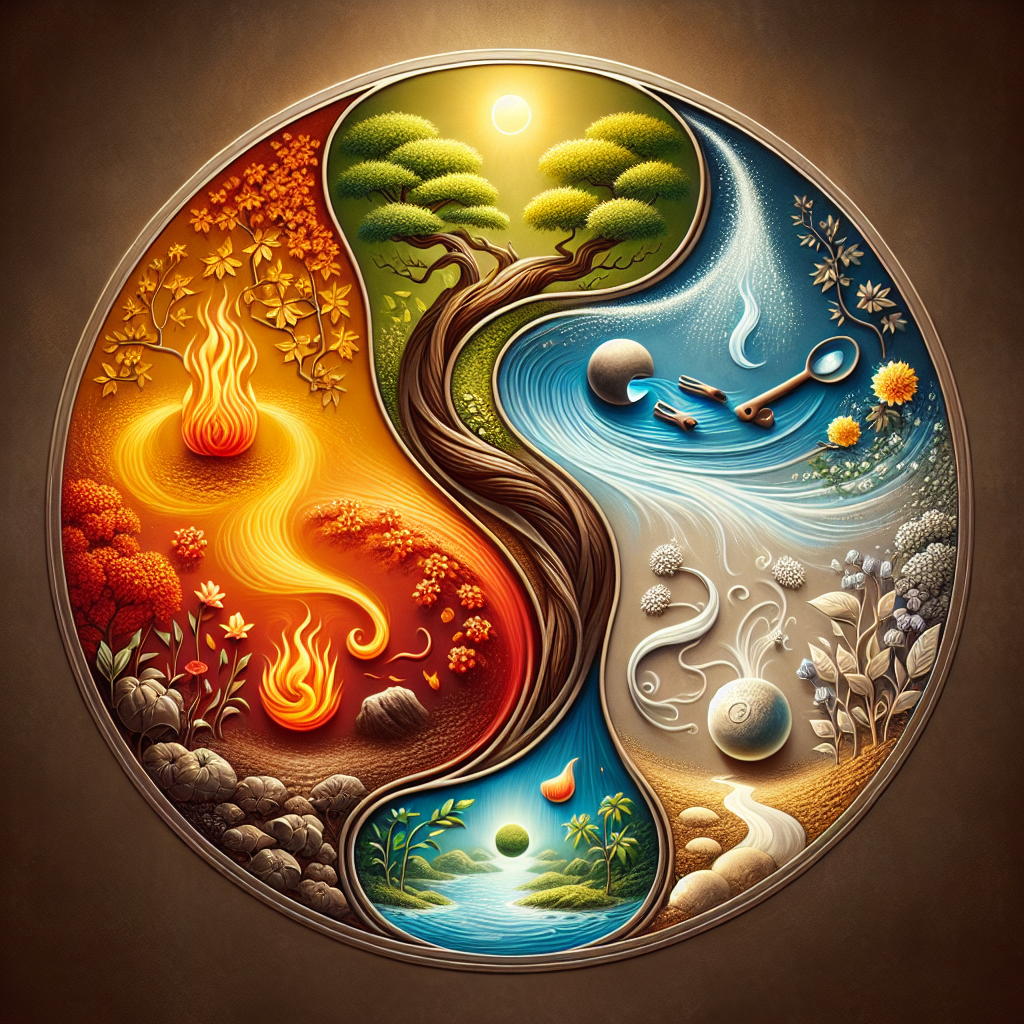Have you ever noticed how a stressful day can give you a headache? Or how excitement makes your heart race? These aren’t just coincidences. According to Traditional Chinese Medicine (TCM), there’s a profound connection between your emotions and your physical health that goes far deeper than you might think.
For over 2,000 years, practitioners of Chinese medicine have understood something that Western medicine is only beginning to acknowledge: our emotional states directly impact our physical wellbeing. This isn’t just about feeling stressed and getting a tension headache—it’s about specific emotions affecting specific organs in predictable patterns.
The ancient wisdom of the Five Elements Theory in Chinese medicine provides us with a fascinating map of these connections. By understanding how your emotions influence your organs, you can take control of your health in ways you never thought possible. Let’s explore this intriguing aspect of elements in Chinese medicine and discover how emotional awareness might be the missing piece in your wellness puzzle.
The Five Elements: Your Emotional-Physical Connection Guide
At the heart of Chinese medicine lies the Five Elements Theory—a sophisticated system that connects everything in our universe, including our bodies and emotions. Each element—Wood, Fire, Earth, Metal, and Water—corresponds to specific organs and emotions in our bodies.
Here’s a quick overview of these fascinating connections:
Wood Element: Connected to the liver and gallbladder, the Wood element is associated with anger, frustration, and irritability. When you’re fuming about that driver who cut you off, your liver energy is being affected.
Fire Element: Linked to the heart and small intestine, Fire governs joy and excitement. That flutter in your chest when you’re falling in love? That’s your Fire element at work.
Earth Element: The spleen and stomach fall under the Earth element, which relates to worry and overthinking. That queasy feeling when you’re anxious about an upcoming presentation? Your Earth element might be out of balance.
Metal Element: Connected to the lungs and large intestine, Metal is associated with grief and sadness. That tight chest feeling when you’re heartbroken? Your Metal element is responding.
Water Element: The kidneys and bladder are tied to the Water element, which governs fear and anxiety. That sudden urge to use the bathroom when you’re terrified? That’s your Water element reacting.
These connections aren’t just theoretical concepts in Chinese medicine. They form the foundation of a holistic diagnostic approach that treats the body as an interconnected system where emotional and physical health are inseparable.
When Emotions Become Physical: Real-Life Examples
Let’s dig deeper into how each element in Chinese medicine manifests in everyday situations:
Wood Element: When Anger Impacts Your Liver
Meet Sarah, who has been dealing with a difficult boss for months. She bottled up her frustration and anger, never expressing how she felt. Over time, she began experiencing migraines, red eyes, and tension in her shoulders. According to Chinese medicine, her unexpressed anger was disrupting the smooth flow of Liver Qi (energy), creating these physical symptoms.
When the Wood element is out of balance, you might experience:
- Headaches, especially behind the eyes
- Irritability and angry outbursts
- Tight shoulders and neck
- Menstrual irregularities
- Digestive issues
The connection between anger and liver health is so fundamental in elements in Chinese medicine that practitioners often ask about irritability when assessing liver function.
Fire Element: When Joy Affects Your Heart
Joy is generally considered a positive emotion, but in Chinese medicine, excessive excitement can also create imbalance. Think about Michael, who was so excited about his upcoming wedding that he couldn’t sleep for weeks. His heart was racing, his mind wouldn’t quiet down, and he felt scattered and unfocused.
When Fire is imbalanced, you might notice:
- Insomnia or restless sleep
- Heart palpitations
- Excessive talking or laughing
- Anxiety or mania
- Circulation issues
The heart houses what Chinese medicine calls the Shen (spirit or mind), so emotional balance is crucial for heart health.
Earth Element: When Worry Impacts Your Spleen
Lisa is a classic overthinker. She analyzes every conversation, worries about the future, and constantly ruminates on problems. Not surprisingly, she also deals with chronic digestive issues, including bloating and irregular appetite. In Chinese medicine, this makes perfect sense—her excessive worry is taxing her Spleen, the organ responsible for digestion.
Earth element imbalances often show up as:
- Digestive problems
- Fatigue, especially after eating
- Tendency to overthink
- Muscle weakness
- Food sensitivities
The Spleen is particularly vulnerable to overthinking and worry, which is why stress management is key for digestive health.
Metal Element: When Grief Affects Your Lungs
After losing his father, James developed recurring respiratory infections and asthma flare-ups. The timing wasn’t coincidental—in Chinese medicine, the lungs are deeply connected to grief. His unprocessed sadness was weakening his lung energy, making him more susceptible to illness.
Metal imbalances might manifest as:
- Respiratory issues
- Skin problems
- Difficulty letting go of the past
- Constipation
- Weakened immunity
The lungs control what Chinese medicine calls the “Wei Qi”—your defensive energy that protects against external pathogens—which is why grief can literally lower your immunity.
Water Element: When Fear Impacts Your Kidneys
Alex has been working in a high-stress environment with constant deadlines and fears of layoffs. Recently, he’s been experiencing lower back pain, hair loss, and decreased energy. From a Chinese medicine perspective, his chronic fear is depleting his kidney energy, which governs vitality and aging.
Water element imbalances often appear as:
- Lower back pain
- Urinary issues
- Premature aging signs
- Bone problems
- Chronic fatigue
The kidneys store what Chinese medicine calls “Jing”—your essential life force—which explains why chronic fear can make you feel prematurely old and exhausted.
The Five Elements as a Diagnostic Tool: How TCM Practitioners See You
When you visit a practitioner trained in elements in Chinese medicine, they’re not just looking at your physical symptoms in isolation. They’re assessing patterns that might involve multiple elements and organs, with emotions as key diagnostic clues.
For example, if you come in with headaches, a TCM practitioner might ask about your stress levels and whether you feel irritated easily. If you mention digestive issues, they might inquire about worry and overthinking. This holistic approach recognizes that treating the physical symptoms without addressing the emotional component only provides temporary relief. Research has confirmed the effectiveness of psychotherapy based on five-element theory in TCM.
The diagnostic process might include:
- Pulse diagnosis: Feeling different positions on your wrist that correspond to various organs
- Tongue examination: Looking at the color, shape, and coating of your tongue
- Detailed questions about emotional patterns
- Observation of your complexion, voice, and demeanor
This comprehensive approach allows practitioners to identify which elements need balancing in your system, leading to more effective treatment plans.
Balancing Your Elements: Practical Approaches
The beauty of understanding elements in Chinese medicine is that it gives you practical tools to restore harmony. Here are some approaches that integrate traditional wisdom with modern lifestyle:
Meditation and Mindfulness
Research confirms what Chinese medicine has long known—meditation calms the nervous system and helps regulate emotions. Even five minutes of daily mindfulness can help balance all Five Elements, particularly Fire (heart) and Water (kidneys).
EASTCHI AI recommends tailored meditation practices based on which elements need balancing in your constitution. For example, if you tend toward anger (Wood imbalance), visualizations involving green forests and gentle expansion can be particularly helpful.
Dietary Adjustments
In Chinese medicine, foods have energetic properties that can balance specific elements:
- Wood/Liver: Sour foods like lemon and vinegar help soothe an irritated liver, while leafy greens support healthy liver function.
- Fire/Heart: Bitter foods like dark leafy greens can calm excess heat, while small amounts of spicy foods can stimulate healthy circulation.
- Earth/Spleen: Sweet foods (natural ones like sweet potatoes, not processed sugar) strengthen the spleen, while warm, cooked foods support digestion.
- Metal/Lungs: Pungent foods like onions and ginger open the lungs, while white foods like pears and radish nourish lung tissue.
- Water/Kidneys: Salty foods in moderation support kidney function, while black foods like black beans and blueberries nourish kidney essence.
HerbalsZen’s EASTCHI AI can create personalized nutritional plans based on your element constitution, helping you use food as medicine to balance your emotional and physical health.
Herbal Remedies
Various herbs in Chinese medicine target specific element imbalances:
- Wood/Liver: Herbs like chai hu (bupleurum) and bai shao (white peony) soothe liver Qi and reduce irritability.
- Fire/Heart: Herbs such as he huan pi (albizzia bark) and suan zao ren (sour jujube seed) calm the spirit and promote restful sleep.
- Earth/Spleen: Herbs like bai zhu (white atractylodes) and fu ling (poria) strengthen the spleen and reduce worry.
- Metal/Lungs: Herbs such as ban xia (pinellia) and chen pi (tangerine peel) support lung function and help process grief.
- Water/Kidneys: Herbs like shu di huang (prepared rehmannia) and gou qi zi (goji berries) nourish kidney essence and reduce fear.
These herbs work not just on physical symptoms but on the emotional components as well, addressing both aspects simultaneously.
Movement Practices
Different forms of movement can balance specific elements:
- Wood/Liver: Activities that involve stretching, like yoga or tai chi, help move stagnant liver Qi.
- Fire/Heart: Moderate cardio exercise regulates heart energy without depleting it.
- Earth/Spleen: Gentle, rhythmic exercises like walking support spleen function.
- Metal/Lungs: Practices focusing on breath, like qigong, strengthen lung energy.
- Water/Kidneys: Gentle flowing movements like swimming nourish kidney essence.
Embracing Balance in Modern Life
Traditional Chinese Medicine offers a unique perspective on how our emotions influence our physical health – a perspective increasingly validated by modern science.
Understanding elements in Chinese medicine offers a powerful framework for self-awareness and health maintenance. By recognizing how your emotions affect specific organs and implementing targeted practices, you can create greater harmony in your body and mind. Your journey to better health through emotional awareness starts now!
This isn’t about suppressing emotions—quite the opposite. Chinese medicine teaches us to acknowledge our feelings while preventing them from becoming stuck or excessive. It’s about creating flow where there’s stagnation and finding balance where there’s excess.
In our modern world of chronic stress and disconnection, this ancient wisdom provides practical solutions. HerbalsZen and EASTCHI AI integrate this traditional knowledge with cutting-edge technology, offering personalized recommendations based on your unique constitution and current imbalances.
By embracing the connections between your emotions and physical health through the Five Elements Theory, you gain access to a profound system of self-healing. Whether you’re dealing with chronic physical symptoms, emotional challenges, or simply seeking greater wellbeing, understanding elements in Chinese medicine offers a holistic path forward.
The next time you feel a strong emotion, pause and notice where you feel it in your body. That awareness is your first step toward harnessing the wisdom of the Five Elements for your health and happiness.



